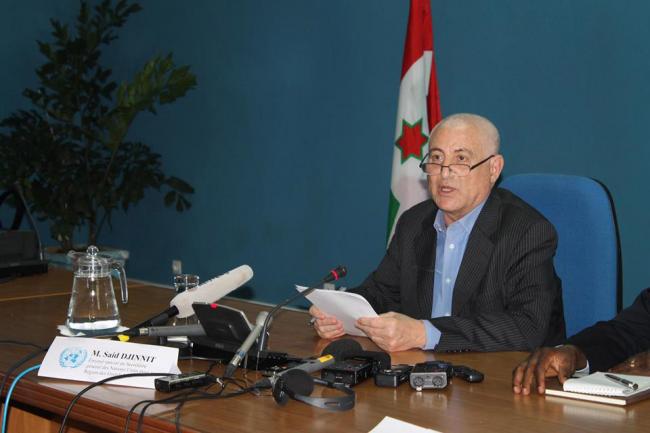Briefing a press conference earlier on Tuesday afternoon, UN Spokesperson Stéphane Dujarric told reporters that the Secretary-General’s Special Envoy for the Great Lakes, Said Djinnit, had returned to the Burundian capital, Bujumbura, after attending the East African Community Summit on Sunday.
Djinnit’s return comes as the UN official seeks to reboot talks with Burundian stakeholders on ways to resume the consultative political dialogue.
Burundi has been embroiled in a political crisis since mid-April when popular protests erupted after the country's ruling National Council for the Defence of Democracy – Forces for the Defence of Democracy (CNDD-FDD) party nominated President Pierre Nkurunziza as its presidential candidate for a third term.
The situation escalated shortly thereafter, on 13 May, following an attempted coup d'état as President Nkurunziza left for the Summit of the East African Community, which was intended to try to resolve the crisis.
Dujarric on Tuesday reported that Under-Secretary-General for Political Affairs, Jeffrey Feltman, had also recently met with the First Vice-President of Burundi, Prosper Bazombanza, and endorsed the recommendations of the East African Summit which, he said, provided the Government with an additional opportunity to create the conditions for peaceful and credible elections.
Moreover, Feltman had encouraged the Burundian Government to seize the opportunity to take concrete steps to ensure the security of the electoral process and of political and civil society actors, the disarmament of armed civilians, the strengthening of the national independent electoral commission (CENI), and the vote of refugees, Dujarric added.
The crisis in Burundi has not only led to growing tensions within the country but has also spawned a troubling humanitarian crisis across the region as thousands of Burundian refugees stream across the country’s borders and into neighbouring states such as Rwanda, Tanzania, and the Democratic Republic of the Congo (DRC).
Since early April, nearly 100,000 Burundians have fled their country, according to UN estimates.
At the same time, a cholera epidemic striking refugees gathered along the shores of Lake Tanganyika in Tanzania has only added to the miseries of the unfolding humanitarian crisis.
The UN Spokesperson, meanwhile, reiterated the Organization’s concern about the possibility of an escalation of violence throughout Burundi and reiterated the UN’s calls for calm and restraint while urging Burundians to express their views peacefully.
In addition, Dujarric noted that Secretary-General Ban Ki-moon had spoken to Presidents Kikwete of Tanzania and dos Santos of Angola by phone yesterday to express appreciation for their leadership in helping address the Burundian crisis.
The Secretary-General reportedly discussed how best the UN, the East African Community and the International Conference on the Great Lakes Region could help defuse tensions and support the holding of peaceful and credible elections in Burundi.
Photo: UN Electoral Observation Mission in Burundi (MENUB)
